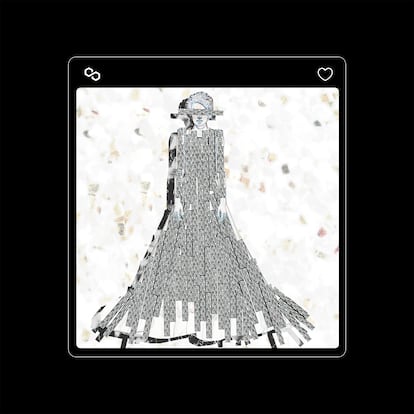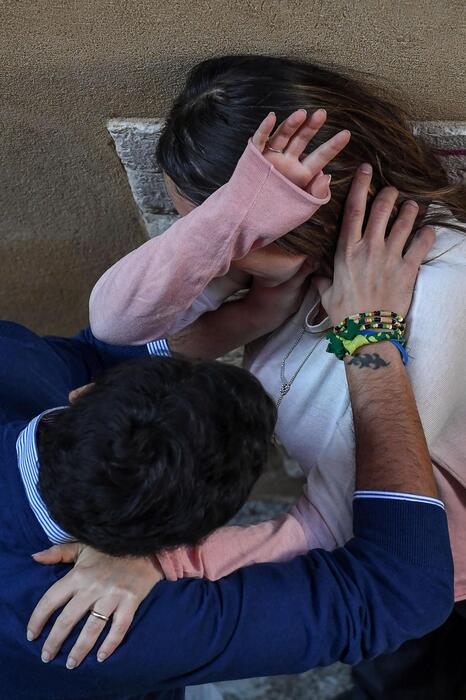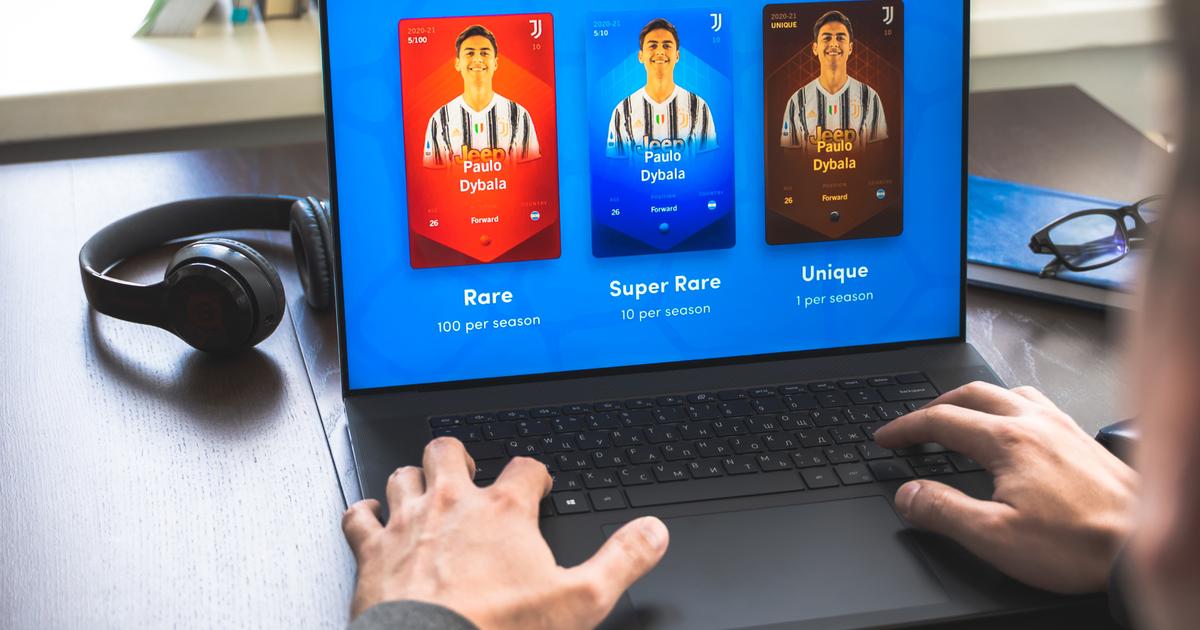Walaa Mostafa, a 35-year-old Egyptian woman from the popular neighborhood of Imbaba, in western Cairo, took out a small loan of 13,000 pounds (about 650 euros) in 2017, shortly before getting married.
As usual, the future spouses shared the task of buying furniture and home appliances.
And since Mostafa still had no savings, she asked a neighborhood merchant for the money, a common occurrence in Egypt, a largely unbanked country.
During the first year, the Egyptian religiously paid each monthly payment, until she returned a little more than half thanks to what she could save from her salary.
Then the problems started.
“I had my first child and then I got really sick and had to go to the hospital and stay there for a month.
So I didn't pay [the following] installments,” she says.
He barely had the equivalent of about 300 euros left to pay, but the merchant with whom he had contracted the debt reported Mostafa to the police.
The woman was then forced to sell some of her furniture and appliances to pay for a lawyer to defend her.
But it did not prevent a court of first instance from issuing a very harsh sentence against her: three years in prison.
Although it might seem so at first, Mostafa was far from the only Egyptian to find herself in such a nightmare.
Known as
al-gharemat
, each year in the country there are thousands of cases of insolvent women who receive very heavy prison sentences and end up behind bars (or on the run) for not being able to satisfy small debts.
“Most prisoners are prisoners due to poverty,” says Nawal Mostafa, founder of the Children of Women Prisoners Association (CFPA) and a prominent activist for this cause.
“They cannot afford to buy an oven, a refrigerator or a TV for their small houses.
And since they are poor, they buy them in installments.
Sometimes they also ask for loans if a family member falls ill, ”she slips.
Nawal Mostafa, with children of imprisoned women. Horizon FCB Dubai
Now, the CFPA, which is one of the most active organizations dedicated to helping these women in Egypt, has teamed up with an advertising agency from the United Arab Emirates, Horizon FCB Dubai, to collect donations and raise awareness of this problem in a peculiar: through non-fungible tokens or NFTs, unique digital images that, although they can be reproduced infinitely, are individually owned.
Inspired by individual stories such as the one told by Walaa Mostafa, the Emirati collective asks artists from around the world to create NFTs that are then put up for sale at a price equal to the amount it will cost to pay off the debt of the woman in question and absolve her. .
In the case of Mostafa, one of the first to benefit from the project in the month of May – coinciding with the end of the month of Ramadan – the NFT was sold for around 300 euros, which the CFPA then paid to its lender.
“We take advantage of NFTs to reimagine them,” says Reham Mufleh, CEO of Horizon FCB Dubai and one of the promoters of the
Break Your Chains with Blockchain
project .
"We wanted to take advantage of their popularity and use them as a means of raising awareness about this issue," she explains.
Legacy of the French colonial legal system on which Egypt was inspired when initially drafting its laws, the country's criminal code today still includes an article on the breach of trust under which the non-payment of a debt is judged.
It contemplates harsh prison sentences of up to three years, as well as an economic fine.
In the case of insolvent debtors, the final punishment can be even higher because sentences can accumulate depending on the number of unpaid checks and receipts and the total number of creditors involved, according to a 2018 thesis by Nivert Elsherif published by the American University of Cairo.
Walaa Mostafa's NFT.Horizon FCB Dubai
Many of those in this situation are mothers from working-class families who need the money to help their children marry, deal with emergencies such as medical or school expenses, or women who had simply cosigned loans, according to the study. above and the testimonials consulted.
And although the number of insolvent people imprisoned or persecuted by the authorities is not known, it is believed that there are at least thousands a year, a very high part of the prison population in Egypt.
Nawal Mostafa notes that in many cases lenders also take advantage of the vulnerable situation of those who contract the debt and their ignorance of the law to defraud them.
“They are forced to accept money from someone, and this person makes them sign receipts for a very large sum, not the real one that they take.
Because of illiteracy and ignorance of the law, they fall into this very serious trap,” he points out.
Mostafa adds that, after their time in prison, many of these women face serious difficulties in reintegrating into their communities due to the strong stigma associated with prison.
One of these cases is that of Hoda Ali, a 42-year-old Egyptian woman born in Sohag Governorate, in the south of the country.
In 2019, Ali took out a loan so he could buy her son a
tuk-tuk
, a motorized tricycle popular as a taxi in Cairo's working-class neighborhoods.
Before long, however, a gang beat up the boy, seriously injuring his face, and stole his vehicle.
Since he was unable to continue working, Ali was unable to repay the money.
“I was forced to pay off the loan with another loan,” she explains.
“I got into a [vicious] circle.”
Hoda Ali's NFT.Horizon FCB Dubai
In total, Ali accumulated seven convictions, with sentences ranging from six months to two years in prison.
She was once arrested and spent two nights in the police station prior to being sent to jail, but her neighbors were able to raise enough money to pay the next loan installment and free her from her.
Ella Ali chose to run away from home and escape time after time to avoid being arrested again.
“It was not my fault: I did it to be able to live and to have money for my family.
It was bad luck,” she recalls.
Thanks to the campaign with the NFTs, the CFPA raised about 350 euros to pay off the seventh and last of its loans, which was the most important, and thus break the cycle.
Despite having achieved it, Ali assures that she is now living alone because none of her three children want to see her and her husband ran away from her when she started having problems.
“Now at least I don't have any convictions.
All of them have disappeared.
I still have a few installments to pay, but I'm trying,” she explains.
The project jointly promoted by the CFPA and Horizon FCB was launched on March 21, coinciding with Mother's Day in Egypt, and to date they have sold 25 NFTs.
Mufleh, from the Emirati group, explains that it is a slow process because each case is carefully chosen by the Egyptian association after having verified it.
It is then that they contact an international artist to explain the case in detail so that he can design a new NFT based on his story.
The objective of the initiative is to try to generate awareness in a striking way
The project has already had the collaboration of artists from the United States, Brazil, Egypt and Portugal, and Mufleh assures that there are others waiting for the next cases.
Both she and Mostafa point out that the aim of the initiative is not so much to free a large number of women, since there are already other organizations that also raise funds for it, but to try to raise awareness in a striking way.
“We think that attracting attention on a large scale could help speed up the process of finding an alternative punishment for defaults,” says the ad agency's director, Reham Mufleh.
In 2014, the Mostafa association launched its own program aimed at teaching a trade to women who are still in prison and those who have just come out of it, so that they have a minimum income on which to start supporting themselves.
They also offer them psychological support and legal training.
And along with prominent public figures and members of the Egyptian Parliament, the organization is dedicated to lobbying for legal change, which Mostafa sees as the ultimate goal of his mission.
“This is an ongoing problem, and that is why we are trying to solve it at its roots.
Not only freeing women from prison, because others are going to enter tomorrow” she sentences.
You can follow PLANETA FUTURO on
,
and
, and subscribe
to our 'newsletter'
here
.









